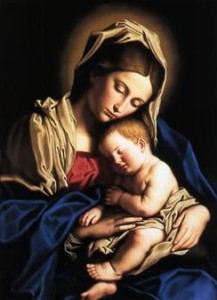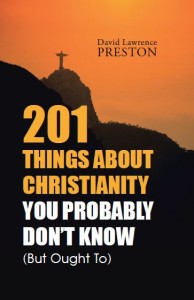It’s not unusual for religious people to believe that their prophet or guru came into the world in a miraculous way, and Christians are no exception. In Yeshua’s case, tradition has it that he was born in Bethlehem, but this was an invention of the authors of Matthew and Luke’s gospels, keen to tie him into an ancient biblical prophecy. Let’s examine the evidence.
The Christmas story which is enacted around the world every December is based on just two gospels – Matthew’s and Luke’s. Combine the two and you get the familiar Christmas tale. An angel impregnated an elderly lady called Elizabeth, who gave birth to a son who became John the Baptist. Shortly after, the same happened to her cousin, a teenage virgin, Mary. Mary’s fiancée, Joseph, a descendant of King David, agreed to conceal the truth.
Meanwhile the Romans ordered a census and decreed that everyone should return to their ancestral home for counting. Joseph and the heavily pregnant Mary travelled from Nazareth to King David’s city, Bethlehem. Their son was born in a stable because there was no room at the inn. They were visited by shepherds and three wise men from the East who saw a bright star and followed it to Bethlehem. Joseph, Mary and the baby then had to escape to Egypt to avoid persecution from King Herod who felt threatened when the wise men told him a new king had been born. Eventually they returned to Nazareth and nothing more was heard of them for over a decade, when they suddenly discovered that the boy was a child genius.
Now apart from the sheer implausibility of such a tale, it is compounded by a number of ‘inconvenient’ facts based on what we know about the history and culture of Palestinian society at that time. Of course these are never pointed out in churches or church literature.
To start with, the above narrative is a combination of two incompatible sources. Both authors had an agenda, and they simply cannot be combined in any truthful way. The only thing they have in common is the alleged location, Bethlehem, and their wish to portray Yeshua’s birth as a profoundly important event. ‘Matthew’ was also concerned to link it in as many ways as possible to Yeshua’s Jewish heritage and the Hebrew prophecies.
There is no mention of this miraculous birth anywhere else in the New Testament: no mention in the first gospel to be written, Mark, and no mention in Paul’s letters, which pre-dated Mark. Paul had met with the disciples Peter and James – surely they would have discussed such a remarkable turn of events as a couple of fecund angels? Or is it simply that these stories hadn’t yet been invented when the earliest New Testament texts were written?
There’s no mention of the birth in the Fourth Gospel; no mention in the Acts of the Apostles; and no mention in the later letters. And nowhere in the gospels does Yeshua make any reference to his birth, and neither do his mother or brothers! Curious!
The young mother
Virgin birth stories were rife in that part of the world at that time, and had been for centuries. But this particular virgin birth story was based on a Greek misunderstanding of a Hebrew prophecy from Isaiah that a ‘young woman’ would give birth. Modern translations[1] read as follows: ‘Look, the young woman is with child and shall bear a son…..’[2] Older translations including the King James Bible say, ‘Behold a virgin shall conceive…’ Regrettably, the flawed old version continues to be widely used, compounding the error.
A virgin birth would have appeared even more amazing in the First Century since they didn’t yet know that the mother produces eggs which are fertilised by the father. They thought the father’s sperm was merely nurtured inside the mother until the baby was born.
Bethlehem
It was especially important for the author of Matthew’s Gospel that Yeshua was seen to come from the town of Bethlehem, since the prophet Micah had foreseen a Messiah being born there[3]. Matthew stated it as a fact[4] but made no attempt to explain why this young Nazarene couple decided to journey through the hostile territory of Samaria to Bethlehem; that trumped-up story came from Luke. The vehicle he chose was a Roman Census which required every citizen to return to their ancestral home. Because Joseph was said to be a descendent of King David, this meant David’s city, Bethlehem.
Good story. The problem is, it simply isn’t true. Historians have searched in vain for an empire-wide census at the time of Yeshua’s birth, but there was none. There was one in 6 CE, but none between 10 BCE and year zero. In any case it would have been impossible for all the Jews, scattered around the Empire, to return to their home towns. And not even the Romans would have insisted that a heavily pregnant woman travel the eighty miles from Nazareth to Bethlehem on a donkey.
Mark’s gospel makes no reference to Bethlehem at all, while the Fourth Gospel reports an incident in which a crowd doubted that he was the Messiah precisely because he did not come from Bethlehem, but from Galilee[5].
The stable scene
Christians everywhere are familiar with the nativity scene set in a stable with the ‘holy family’ surrounded by farm animals, shepherds, angels and the three wise men bearing gifts of gold, frankincense and myrrh, all paying tribute to the new ‘king’. But how credible is this? According to Luke’s gospel, the shepherds went to the stable immediately, but surely it must have taken weeks for the wise men to arrive from wherever they came? And what happened to the gold, frankincense and myrrh? If Mary and Joseph had had these things they could have sold them and lived the rest of their lives in comfort.
In November 2012 the Pope remarked that nativity scenes should not show cows, donkeys or a choir of angels because they aren’t mentioned in the Bible, conveniently skirting round the issue of whether the birth story had any validity at all!
The flight into Egypt
According to Luke[6], Yeshua soon returned to Nazareth. But Matthew’s gospel says that Mary, Joseph and the baby fled to Egypt to avoid an order from King Herod that all new born Jewish boys be killed. But there’s no record of any such decree, and no record of a slaughter of Jewish babies at that time. It is merely a way of linking Yeshua’s birth to the passage in the scriptures in which Yahweh says, ‘Out of Egypt I called my son.’[7]
Literary inventions
When Bishop David Jenkins said he did not believe in the gospel birth stories in the early 1980s he was widely chastised in Christian circles, but he was merely articulating a view that had existed among Bible scholars for centuries. For example, Dr Albert Schweitzer wrote in The Quest of the Historical Jesus, ‘The histories of Yeshua’s birth are not literary versions of a tradition, but literary inventions,’ concocted specially for the purpose of glorifying Yeshua.
Historical evidence – and two of the gospels – strongly suggest that Yeshua was born and raised in Nazareth. There was no reason for his parents to be in Bethlehem for his birth, and no reason to seek refuge in Egypt.
So were ‘Matthew’ and ‘Luke’ liars? Yes and no. Like many writers, they saw no harm in using a little artistic licence. They probably borrowed a few ideas from other cultures too. They simply wanted to encourage people to join their new community because they believed in its message.
In the longer term they helped to bring Yeshua’s his life and teachings to wider prominence, but, along the Apostle Paul’s teachings, turned people’s attention away from what he taught to who he was. And this is perhaps their greatest legacy.
©David Lawrence Preston, 30.11.2016
Follow me on Facebook and Twitter, @David_L_Preston
Read my book, published by Balboa Press
[1] New Revised Standard Version, 1989, Oxford University Press
[2] Isaiah 7:14
[3] Micah 5:2
[4] Matthew 2:1
[5] John 7:40-42
[6] Luke 2:39
[7] Hosea 11:1




Leave a Reply